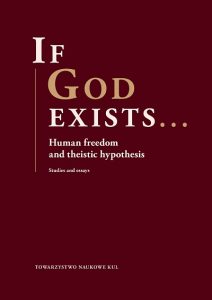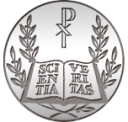The project was financed by the National Science Center as part of the OPUS 8 research project: UMO-2014/2015/B/HSI/00406

Tiltle: If God Exists… Human freedom and theistic hypothesis. Studies and essays
Edited by Andrzej P. Stefańczyk and Roman Majeran
Translators: Roman Majeran and Barbara Kulicka
e-ISBN: 978-83-7306-843-8
DOI: 10.18290/2019enIf_God_exists
Pobierz / Download: PDF

STRICT DETERMINISM OR FATALISM as a theory of reality can be suggested by diverse considerations: natural, theological, ontological or logical. The logically generated problem of fatalism arises when the assumption is made that true propositions concerning temporal events remain always true regardless of how they are indexed with respect to time; in particular, propositions correctly describing future contingent events are true even before the described events take place; in fact they have always been and will always remain true, even though their tense index changes in the course of time. However, if this assumption is true, contingent temporal events appear to be have already been determined before their actual cccurrence, since it has always been true that they should happen thus and so and, consequently, they cannot happen otherwise. Yet if all apparently contingent facts are in fact predetermined, there is no true contingency in the world and thus no freedom (since contingency is a necessary precondition of freedom). The great concern of philosophers in various historical contexts was the question how to reconcile true, and not merely apparent, human freedom with the apparently plausible assumption that propositions correctly describing future contingent states of affairs possess the value of truth.
The problem of fatalism as logically grounded (often referred to as logical fatalism) becomes compounded and acquires a new dimension when placed in a theological context and related to God’s eternal and infallible omniscience which necessarily extends to every minute events in the world, whether truly or only seemingly contingent. Thus the problem of theological determinism or fatalism includes the problem of logical determinism while adding to it new, specifically theological dimensions. Determinism or fatalism can also be variously defined depending on what factor is regarded as the ultimate ground for all determination in reality, and thus we have a mechanistic (causal), physical (nomological), teleological and other kinds of determinism. Yet whatever kind of determinism may be in question, the paramount philosophical problem facing those who consider it is whether, given the presence of the determining factors in reality, we, humans, can still legitimately regard ourselves as free and responsible beings, endowed with true freedom of choice. The volume we present to the reader is a kind of record of a great debate that has been going on in history of philosophical thought, and is still continued in contemporary philosophical reflection, on whether and in what measure, in the face of nature’s inflexible laws and all-powerful and omniscient God, before the tribunal of reason, we can affirm ourselves to be truly and not merely apparently free and to possess real freedom of choice, in a certain measure at least.
From the Introduction

